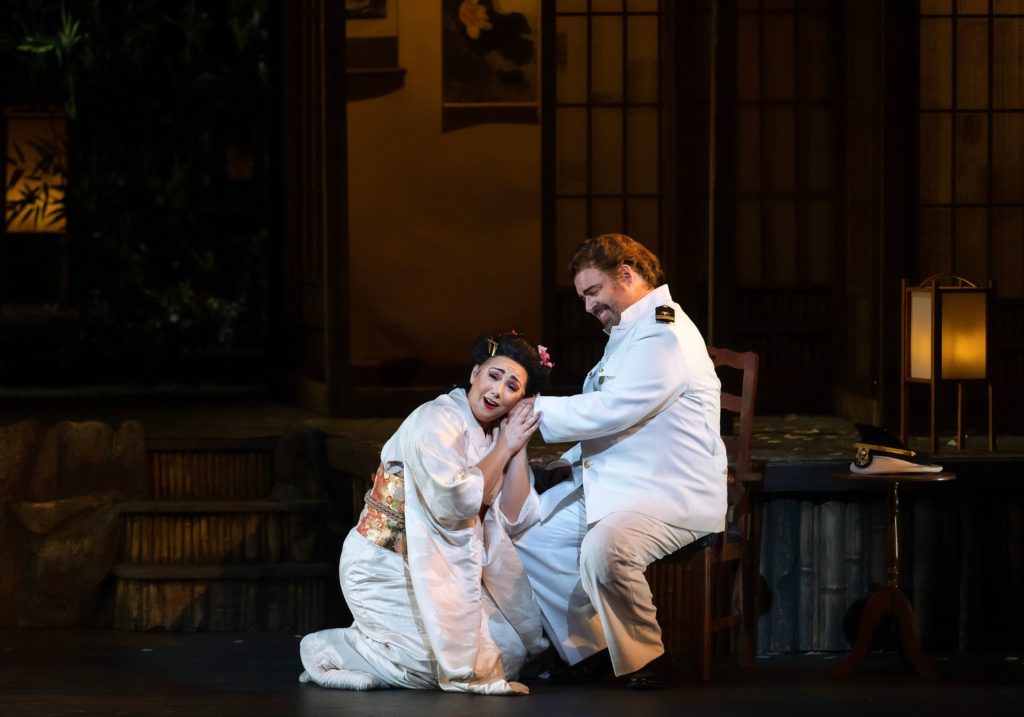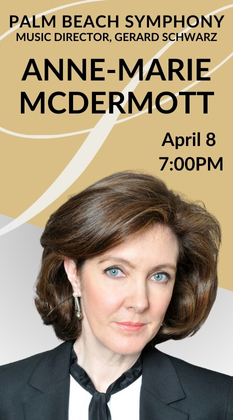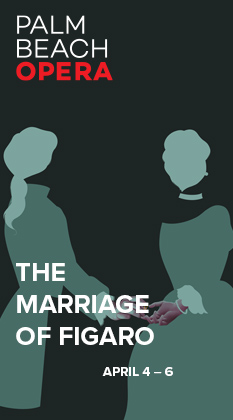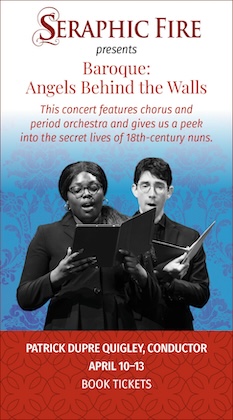Palm Beach Opera opens season with an affecting, mostly well sung ”Butterfly”

Jennifer Rowley and Jonathan Burton star in Puccini’s Madama Butterfly at Palm Beach Opera. Photo: Bruce Bennett
Jennifer Rowley has sung Tosca, Aida and other classic roles. But until Friday night, the American soprano had never portrayed one of the most famous heroines in opera, the betrayed, doomed Japanese teenager of Puccini’s Madama Butterfly.
Palm Beach Opera’s season opened at the Kravis Center in West Palm Beach with Rowley giving an affecting, richly sung and dramatic performance in Puccini’s masterpiece. Her portrayal of Cio-Cio-San, first seen as a 15-year-old girl about to wed the dashing American naval officer B.F. Pinkerton, exuded vulnerability and seriousness, with less of the girlish, coquettish quality some singers bring to the role.
The performance of the entire cast was admirable. If the singing wasn’t always faultless, there were no real weak links.
The orchestra under conductor Carlo Montanaro turned in its usual strong performance, with delicate, transparent string playing, evocative performances in wind and brass, and lustrous accounts of the searingly harmonized passages that give the work its unique quasi-Japanese tone.
The action unfolded on elaborate, traditional sets from New York City Opera: a footbridge, a house with sliding screen walls, and a dark, craggy tree looming over the scene like a portent of bad things to come. In the background was an image of Nagasaki’s harbor, with stars and an orange moon that emerged for the evening love scene.
Rowley appeared first crossing the footbridge, as she excitedly approached her impending marriage with the American officer. In “Ancora un passo (“One step more”), as she nears the house surrounded by relatives, her sensitive phrasing expressed the hopefulness, shyness, joy and excitement of undertaking what she thought would be her new life.
If her high notes were unfocused, Rowley’s plush voice and seamless phrasing helped create a vivid portrayal of Butterfly’s transformation from hopeful newlywed to devastated woman facing a terrible reality. Her performance of “Un bel dì” (“One fine day”), an aria celebrated for its climactic high notes, was notable for the rich tones of her lower register as she spun her elaborate, desperate fantasy of Pinkerton’s return.
In the final scene, as Butterfly solemnly faced reality and embraced her fate, she brought to the role an immense dignity and emotional maturity that seemed a far distance from 15-year-old girl of the opera’s beginning. The role will be sung Saturday by Toni-Marie Palmertree, with Rowley returning for Sunday’s final matinee performance.
With his white naval uniform, dark mustache and smiling bemusement at the ways of the Japanese, the tenor Jonathan Burton made a convincing Pinkerton. At first, in the aria “Dovunque al mondo,” in which he brags about the carefree life of the “Yankee” who can take his pleasures wherever he wants, his singing was uneven, his high notes coming off as dry and lacking in vocal gleam.
But he warmed up, appropriately, for the love scene with Cio-Cio-San, bringing a smooth legato, richer tone and raw urgency to the portrayal of the sexually ravenous officer. He and Rowley brought the scene to a stirring climax, singing full out over the surging tones of the orchestra. The role of Pinkerton will be sung Saturday by Robert Watson, with Burton returning for the Sunday performance.
As Sharpless, the American diplomat who warns Pinkerton against toying with Butterfly’s emotions, the baritone Troy Cook was the portrait of respectability in black three-piece suit, watchchain and walking stick. Vocally he always delivered, singing in vivid tones in his opening duets with Pinkerton. One of the most stirring moments of the opera, the trio “Io so che alle sue pene,” in which he, Pinkerton and Suzuki realize the utter devastation faced by Butterfly, came off as particularly moving thanks to the warmth and humanity of his vocal performance
Under stage director Alison Moritz, performances came off as particularly naturalistic, without the stylized gestures and movements that would have appeared to portray western stereotypes of Japanese people.
The mezzo-soprano Renée Tatum made much of the role of the loyal servant Suzuki, bringing a velvety tone, fine sense of drama and warm compassion to the part.
The role of the marriage broker Goro, who sets up Butterfly with Pinkerton and is eager to earn further fees by setting her up with others, is usually treated as something of a stock figure, the colonialist stereotype of the servile, scurrying native fixer. The tenor Joshua Sanders portrayed him in a more restrained, rounded manner, with Goro still coming off, rightly, as loathsome, but no longer a cliché.
As the Bonze, patriarch of Butterfly’s family, the bass-baritone Jongwon Han was an imposing figure. Bald, with a long gray beard, he denounced and cursed Butterfly in terrifying tones, his performance buoyed by a baleful crescendo in the orchestra
The role of Butterfly’s toddler Sorrow is usually taken by a small boy who is treated as a glorified stage prop – some productions even use a puppet. But at Palm Beach Opera, James Ayoub handled the role like a pro, hugging his mother at the right times, gathering flower petals and peering through a spyglass toward the harbor in hopes of spotting his father’s ship.
Palm Beach Opera’s production of Madama Butterfly will be repeated 7:30 p.m. Saturday with a different cast and 2 p.m. Sunday at the Kravis Center in West Palm Beach. pbopera.org
Posted in Performances
One Response to “Palm Beach Opera opens season with an affecting, mostly well sung ”Butterfly””
Leave a Comment
Sat Jan 21, 2023
at 10:22 am
1 Comment





Posted Jan 24, 2023 at 5:41 am by zidane
thank you for the article